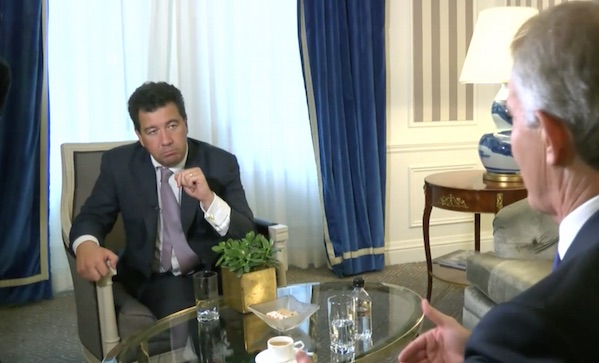A few pages into his memoir Confessions from Correspondentland, we learn that Nick Bryant got his first notoriety by breaking into Piers Morgan’s office. Morgan, then the editor of British tabloid and Rupert Murdoch vehicle News of the World (which was shuttered after a phone hacking scandal), had previously put a reporter into No 10 Downing Street in order to loudly and cynically decry the lack of security at the Prime Minister’s office. And so, Bryant’s bosses at the BBC though it might be funny for them to have their own reporter break into Morgan’s office. According to Bryant, he was reclining in Morgan’s chair when Morgan discovered him and demanded he leave. Forty-eight hours later, Bryant was dispatched to Israel, following Rabin’s assassination.
In the English-speaking world, nobody beats the British when it comes to reporting, be it newspapers, magazines, radio, or television. They dominate the top of the market—witness the ubiquity of the Economist—and Fleet Street is home to the lords of gutter journalism. The Americans, the only real challengers to journalistic hegemony, are too isolated and insular to do consistently world-class foreign reporting, and besides, the fact that the British used to be the world’s superpower but are no longer gives them something of a detached, wry, and some would say acerbic, view of the world.
It’s from this crucible Bryant learned his trade, and after cutting his teeth in the war reporter’s nursery of Northern Ireland, he worked as a foreign correspondent in Washington, Israel, Afghanistan, Pakistan, India, Sri Lanka, and finally Australia. He has an insider’s view of the business of news—and it is a business—which pairs nicely with his outsider’s perspective of the countries in which he worked. He was in Washington for Clinton’s impeachment, drawing a slightly more comic picture of that sceptical than the American media at the time were willing to admit, and he was around for the election of Bush and all the tumult that brought. Bryant doesn’t just cast fresh eyes on the run up to the Iraq War, but lets us in behind the scenes for the White House’s confrontational relationship with the press corps (something Canadian reporters covering Rob Ford or Stephen Harper can understand) and the move among newspapers, particularly the New York Times, away from correspondents with good hair to ones with expertise in terrorism and chemical weapons.
The glaring omission from Byrant’s career is Iraq, which he’s covered from everywhere but the country itself (he says as much), but he makes up for it with his coverage of the subtler and more difficult problems of Afghanistan, his time in the eternal powder keg that is Pakistan, and finally his expansive coverage of India, which, during his time there, saw watershed elections and the 2004 tsunami.
It’s something of habit for people who consider themselves news junkies to leave passive-aggressive comments like “this is why we can’t trust the mainstream media” on articles that challenge their own particular little comfortable worldview. If you’re one these people, I wouldn’t suggest this book (or any book, really). But if you’re the sort of person who has stopped reading the comments section of news sites because of the people above, pick up Confessions from Correspondentland. It not only serves as a clear-eyed look back at fifteen years of the world of international affairs, but it teases out all the factors that go into reporting: confronting biases, exposing nationalism, inflaming readership, being honest to people who might kill you, and all the little practical details like scrounging lunch in a war zone.
Dave Robson is the editor of DailyXY. He spends his time reading books, drinking Scotch, and smoking cigars.
YouTube.


